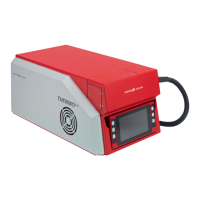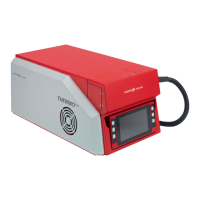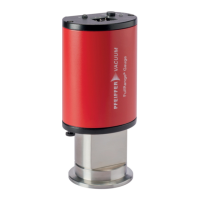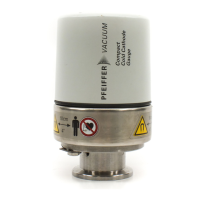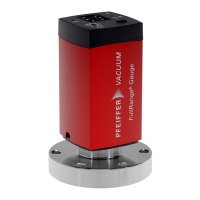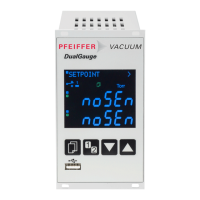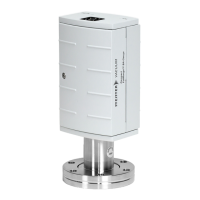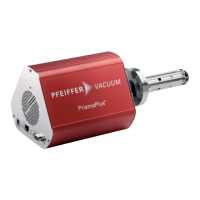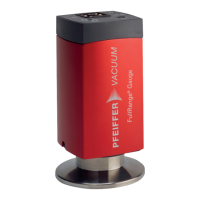Do you have a question about the Pfeiffer Vacuum OMNISTAR and is the answer not in the manual?
Information on the product nameplate for communication with Pfeiffer Vacuum.
Applies to products with part numbers corresponding to the following key.
Details the intended use for standard and corrosive gas versions of the GSD 320.
Details hazard levels (DANGER, WARNING, CAUTION, NOTE) and related safety information.
Defines pictograms used in the manual for safety warnings and actions.
Specifies that only trained personnel should perform work described in the manual.
Covers product usage, electrical hazards, maintenance, operation, and protective devices.
Provides guidance on handling gases and process media with the GSD 320.
Outlines conditions under which Pfeiffer Vacuum assumes no liability.
Information on application, operating, and maintenance courses offered by Pfeiffer Vacuum.
Describes the front panel controls, indicators, and physical features of the GSD 320.
Details the various connection ports on the rear of the GSD 320 unit.
Explains the function of LEDs, buttons, and the LCD screen on the front panel.
Specifies the detector type used in the GSD 320 system.
Details the type and configuration of the ion source.
Lists the mass range specifications and sensor performance.
Identifies the optional calibration compound used with the GSD 320.
Outlines the different scan speeds available for analysis.
Provides specifications for the capillary gas connection, including materials and temperature.
Details the specifications for the process gas, including pressure and flow rate.
Specifies requirements for corrosive gas applications, including purge gas and impurities.
Details the admissible pressure and flow rate for exhaust gas.
Lists the materials used for components on the vacuum side of the system.
Provides information on system readiness and pump-down times.
Specifies the recommended ambient conditions for storage, transport, and operation.
States the noise level of the GSD 320 during operation.
Details the voltage, frequency, power consumption, and fuses for power connection.
Describes the software and communication interfaces used with the GSD 320.
Details the analog and digital inputs/outputs and connectors for user control.
States the weight of the GSD 320 unit.
Provides the physical dimensions (L x W x H) of the GSD 320.
Provides instructions and warnings for safely carrying and transporting the GSD 320 unit.
Details the procedure for removing transport locking mechanisms before operation.
Specifies the necessary clearance for adequate ventilation and cooling of the unit.
Instructions for connecting the exhaust gas line, including notes for corrosive applications.
Details the connection of the purge gas, its purpose, and safety precautions.
Instructions for connecting the capillary, including cautions for handling and bending.
Describes connecting the TCP/IP ethernet and I/O connectors for system interaction.
Instructions for connecting the GSD 320 to the power source.
Directs users to installation instructions for the QUADERA software package.
States that installation must be completed as described in Chapter 5.
Details the step-by-step procedure for the initial startup of the GSD 320 system.
Describes how to operate the GSD 320 using the front panel interface, keypad, and LCD.
Provides instructions for setting up and running the GSD 320 system using the QUADERA software.
Refers to safety instructions found in Chapter 2 for the Vari OmniStar.
Describes the intended use of the GSD 320 Vari OmniStar for gas analysis.
Illustrates and describes the major components and functional block diagram of the Vari OmniStar.
Provides instructions for connecting the Vari OmniStar to the measurement point, controller, and power.
Details the steps for initial start-up of the Vari OmniStar, including parameter checks and temperature control.
Guidance on contacting Pfeiffer Vacuum service for maintenance issues.
Shows a disassembled view of the inlet system and its main components.
Procedure for replacing the EVR 116 component, including safety warnings.
Information on maintenance courses offered by Pfeiffer Vacuum for the GSD 320.
Instructions for cleaning the exterior of the GSD 320 unit safely.
Procedure for shortening the capillary on the Omnistar model, including tools and steps.
Procedure for shortening the capillary on the Thermostar model, including tools and steps.
Step-by-step guide for replacing a dirty or clogged capillary on the GSD 320.
Instructions on how to re-orient the capillary for optimal gas inlet configuration.
Procedure for removing the PrismaPlus unit from the GSD 320, likely for filament replacement.
Refers to PrismaPlus Operating Manual for instructions on filament replacement.
Instructions for cleaning or replacing the filter mat on the GSD 320.
Procedure for replacing the orifice on the OmniStar model, including tools and steps.
Procedure for replacing the orifice on the ThermoStar model, including tools and steps.
References diaphragm pump operating manual for maintenance details.
References turbo pump operating manual for external cleaning and fluid changes.
Provides a schedule for maintenance and service tasks for various GSD 320 components.
Details the capillary heater adapter and its ordering number.
Guidance on what information to provide when ordering spare parts.
Lists spare parts common to both OmniStar and ThermoStar systems.
Lists spare parts specifically for the OmniStar configuration.
Lists spare parts specifically for the ThermoStar configuration.
Steps for ensuring fast, smooth servicing and repair processes.
Procedures and requirements for shipping contaminated pumps or devices.
Notes on using pre-configured exchange units and setting parameters.
States that service orders are carried out according to repair conditions.
Instructions for separating product components for disposal or recycling.
Details the configuration settings for the RVC 300 Valve Controller.
Specifies brand, type, port, and min/max values for sensor settings.
Details the serial interface type and parameters.
Provides general settings for LCD contrast, measure units, language, and reset options.
Defines parameter settings for pressure, source, and controller type.
| Brand | Pfeiffer Vacuum |
|---|---|
| Model | OMNISTAR |
| Category | Measuring Instruments |
| Language | English |
